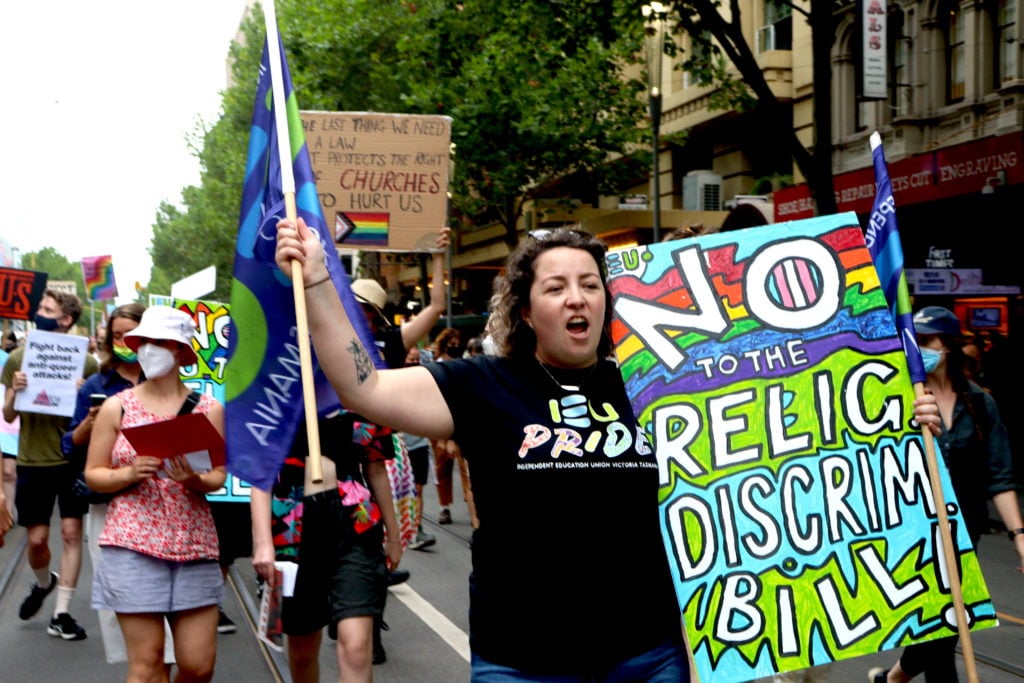If you haven’t guessed from all the corporations suddenly adorning their websites and shop windows with rainbow flags, today is IDAHOBIT.
The International Day Against Homophobia, Biphobia and Transphobia is cause for celebration – and we’re keen to do just that – but it’s also a day that stems from a long history of discrimination against LGBTQIA+ people that continues to the present day.
IDAHOBIT originated on 17 May 1990 when the World Health Organisation removed homosexuality from the Classification of Diseases and Related Health Problems.
More than thirty years later, we still encounter the consequences of stigma and stereotypes in our daily lives. That’s why union members are working together to create queer-friendly workplaces.
We have had a stellar win for women and LGBTQIA+ workers only yesterday when we won support for 10 days paid family & domestic violence leave in our Fair Work case.
We’ve made some huge achievements this year and are striving towards even better workplaces to make sure no one is left behind.
Trans rights are union business
When the Morrison Government attempted to pass a transphobic Religious Discrimination Bill earlier this year, unions pushed back hard.
The legislation would have allowed people to make discriminatory ‘statements of belief’.
People would have been protected in making religious statements even if they were discriminatory, homophobic, sexist, harmful or hostile. Workplaces would’ve become even more unsafe for women, queer people and people with disability. Unacceptably, the Bill would have overridden hard fought protections in other states.
Unions, including the Victorian and Tasmanian branch of the Independent Education Union of Australia, immediately put their foot down against the bill.
The IEU had just won a huge campaign in 2021 that resulted in Victorian legislation preventing religious organisations and schools from sacking or refusing to hire people based on sexuality, gender identity or marital status. The religious discrimination bill was going to override these protections.
“This is a major boost for the rights of education staff. It’ll help promote inclusivity, reform cultures and improve the lives of countless dedicated workers,” IEU Victoria/Tasmania general secretary Deb James said at the time.
But the IEU was determined that the federal Religious Discrimination Bill would never see the light of day, especially because it would override what gains had just been made in Victoria.
Most of the IEU’s 75,000 members work in faith-based schools. So the union launched a petition, took to the streets and IEUA leaders appeared at the Parliamentary Joint Committee on Human Rights along with the Australian Education Union, the Australian Nursing and Midwifery Federation, and the National Tertiary Education Union to explain just how damaging the legislation would be for workers.
The bill was defeated thanks in part to the activism of union members who called out against the legislation every step of the way.
That’s exactly what union members do – we stick up for our colleagues and make sure everyone has access to safe workplaces.

Gender Affirmation leave coming soon to a university near you
Although much of the media spotlight around trans issues have been on schools, universities also have their own challenges.
The National Tertiary Education Union (NTEU) is on a country-wide campaign to ensure all university staff can access paid Gender Affirmation leave.
Amy Sargeant is national convenor of Queer Unionists in Tertiary Education – what she describes as the “queer caucus” of the NTEU.
She distinguishes Gender Affirmation leave from Gender Transition leave, explaining that, “Gender affirmation is a years-long process that encompasses social changes, medical changes, legal changes”.
A massive 95% of trans workers transitioning in the workplace left their jobs – and it’s a preventable figure.
Sargeant says the NTEU campaign for Gender Affirmation leave, “seeks to alleviate some of the challenges relating to remaining employed as a teacher or lecturer at a university when you’re trans and need to transition”.
“Workers can take paid time off to go do those things – whether those things are doctors’ appointments, legal appointments – to alleviate some of that pressure.”
It’s a campaign that all NTEU branches across the country are working to make happen. Sargeant emphasises how much they want to see action and not just optics.
“It’s one thing to have your campus with little rainbow flags and stickers and badges around. But it’s hollow if it’s not followed by action. So, this is one way university management can take action to support one of the most vulnerable groups in their worker base,” she says.
“Trans and gender diverse people enrich our workplace.”
Your union is there for you everyday
These campaigns are what union members do day in, day out – we show up for workers and ensure no one is left behind.
As union members, our actions are never for the advancement of the individual alone. That’s why we act to make changes that benefit everyone.
Union members are building fairer and safer workplaces for today – and tomorrow.











SHARE:
How unions are building queer-friendly workplaces